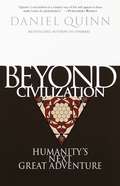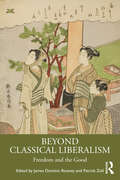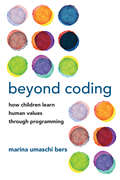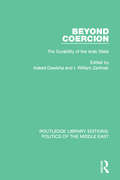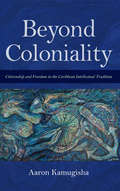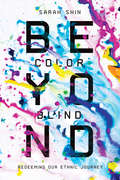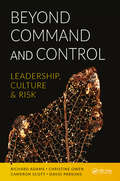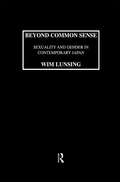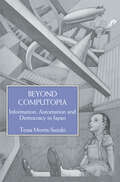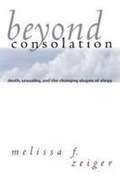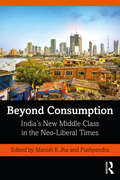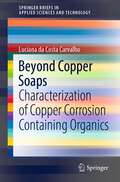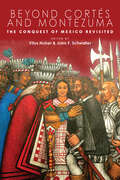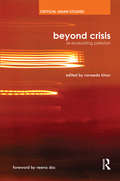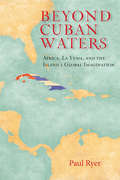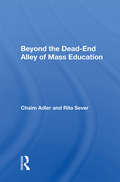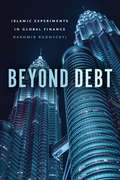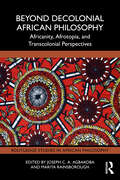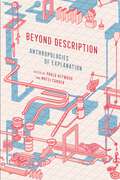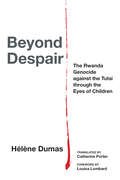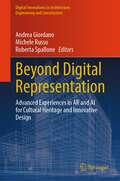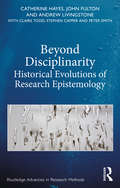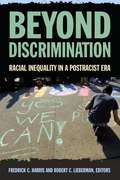- Table View
- List View
Beyond Civilization: Humanity's Next Great Adventure
by Daniel QuinnIn his first work of nonfiction to build on the ideas of his "Ishmael" books, Daniel Quinn argues provocatively that civilization--a system to which we cling as it carries us toward global catastrophe--is an idea whose time has past. If humanity is to survive, we must move beyond civilization, not back to the tribal cultures that sustained our species for millions of years, but forward to a new tribal way of life that is right for our age. This new tribal culture is best exemplified by a circus whose members all work toward the same goal. In Beyond Civilization, Quinn argues persuasively that this is no utopian dream. It is a vital necessity that we must begin moving toward today. "[Quinn] shows us that getting 'beyond' the mess of civilization doesn't mean changing human nature or setting off a revolution. We only need breathe new life into an ancient human strategy for survival. Quinn's plan is inspiring & devilishly clever. " --John Briggs, author of Seven Life Lessons of Chaos.
Beyond Classical Liberalism: Freedom and the Good
by James Dominic Rooney Patrick ZollThis volume brings together diverse sets of standpoints on liberalism in an era of growing skepticism and distrust regarding liberal institutions. The essays in the volume: • Relate concerns for liberal institutions with classical themes in perfectionist politics, such as the priority of the common good in decision-making or the role of comprehensive doctrines. • Analyse how perfectionist intuitions about the political life affect our concepts of public reason or public justification. • Outline various moral duties we have toward other persons that underlie the liberal institutions or notions of rights functioning across the contemporary political landscape. • Explore various aspects of pluralism from within influential religious or philosophical traditions, applying insights from those traditions to issues in contemporary politics. The comprehensive volume will be of great interest to scholars, students, and researchers of politics, especially those in political philosophy and political theory.
Beyond Coding: How Children Learn Human Values through Programming
by Marina Umaschi BersWhy children should be taught coding not as a technical skill but as a new literacy—a way to express themselves and engage with the world. Today, schools are introducing STEM education and robotics to children in ever-lower grades. In Beyond Coding, Marina Umaschi Bers lays out a pedagogical roadmap for teaching code that encompasses the cultivation of character along with technical knowledge and skills. Presenting code as a universal language, she shows how children discover new ways of thinking, relating, and behaving through creative coding activities. Today&’s children will undoubtedly have the technical knowledge to change the world. But cultivating strength of character, socioeconomic maturity, and a moral compass alongside that knowledge, says Bers, is crucial. Bers, a leading proponent of teaching computational thinking and coding as early as preschool and kindergarten, presents examples of children and teachers using the Scratch Jr. and Kibo robotics platforms to make explicit some of the positive values implicit in the process of learning computer science. If we are to do right by our children, our approach to coding must incorporate the elements of a moral education: the use of narrative to explore identity and values, the development of logical thinking to think critically and solve technical and ethical problems, and experiences in the community to enable personal relationships. Through learning the language of programming, says Bers, it is possible for diverse cultural and religious groups to find points of connection, put assumptions and stereotypes behind them, and work together toward a common goal.
Beyond Coercion: The Durability of the Arab State (Routledge Library Editions: Politics of the Middle East #6)
by Adeed Dawisha I. William ZartmanThis volume, first published in 1988, analyses the process of stabilisation amongst the Arab states, a process that has contradicted all predictions of impending disintegration and impending collapse. Although there were some cases of disintegration, there are evidently mechanisms at work that helped consolidate the majority of Arab states and the Arab state system. Revolutions, as in Iran or the Sudan, or political collapse and disintegration, as in Lebanon, have been highly visible but nevertheless exceptions. This collection, Volume Three in the Nation, State and Integration in the Arab World research project carried out by the Istituto Affari Internazionali, focuses on the problem of explaining the stability and persistence of the state in the Arab world.
Beyond Coloniality: Citizenship and Freedom in the Caribbean Intellectual Tradition (Blacks in the Diaspora)
by Aaron KamugishaAgainst the lethargy and despair of the contemporary Anglophone Caribbean experience, Aaron Kamugisha gives a powerful argument for advancing Caribbean radical thought as an answer to the conundrums of the present. Beyond Coloniality is an extended meditation on Caribbean thought and freedom at the beginning of the 21st century and a profound rejection of the postindependence social and political organization of the Anglophone Caribbean and its contentment with neocolonial arrangements of power. Kamugisha provides a dazzling reading of two towering figures of the Caribbean intellectual tradition, C. L. R. James and Sylvia Wynter, and their quest for human freedom beyond coloniality. Ultimately, he urges the Caribbean to recall and reconsider the radicalism of its most distinguished 20th-century thinkers in order to imagine a future beyond neocolonialism.
Beyond Colorblind: Redeeming Our Ethnic Journey
by Sarah Shin• 15th Annual Outreach Magazine Resource of the Year - Also Recommended in Racial Reconciliation • 2017 Foreword INDIES Award Finalist For a generation or so, society has tried to be colorblind. People say they don’t see race. But this approach has limitations. In our broken world, ethnicity and racial identity are often points of pain and injustice. We can’t ignore that God created us with our ethnic identities. We bring all of who we are, including our ethnicity and cultural background, to our identity and work as God's ambassadors. Ethnicity and evangelism specialist Sarah Shin reveals how our brokenness around ethnicity can be restored and redeemed, for our own wholeness and also for the good of others. When we experience internal transformation in our ethnic journeys, God propels us outward in a reconciling witness to the world. Ethnic healing can demonstrate God's power and goodness and bring good news to others. Showing us how to make space for God's healing of our ethnic stories, Shin helps us grow in our crosscultural skills, manage crosscultural conflict, pursue reconciliation and justice, and share the gospel as ethnicity-aware Christians. Jesus offers hope for healing, both for ourselves and for society. Discover how your ethnic story can be transformed for compelling witness and mission.
Beyond Command and Control: Leadership, Culture and Risk
by David Phillip Parsons Richard Adams Christine Owen Cameron ScottThis book will advance the understanding of leadership beyond the inherited myths and modalities of command and control. Leadership is separated from ideas and institutional seniority and explained as the collaborative power of one with others. Enabling the intelligent co-participation of all people, the constructive effect of this approach to leadership is in the engagement of people. This is significant when task accomplishment depends not on managerial direction, but on the interaction of people with each other, with technical systems, and with complex regulations which are often across jurisdictional boundaries. Examples and case studies are included.
Beyond Common Sense: Sexuality And Gender In Contemporary Japan
by LunsingFirst published in 2001. Routledge is an imprint of Taylor & Francis, an informa company.
Beyond Computopia
by Tessa Morris-SuzukiFirst published in 1988. Routledge is an imprint of Taylor & Francis, an informa company.
Beyond Consolation: Death, Sexuality, and the Changing Shapes of Elegy
by Melissa F. ZeigerUsing as her starting point the story of Orpheus and Eurydice, Melissa F. Zeiger examines modern transformations of poetic elegy, particularly as they reflect historical changes in the politics of gender and sexuality.
Beyond Consumption: India’s New Middle Class in the Neo-Liberal Times
by Jha K PushpendraThis book analyses India’s middle class by recognising the diversity within the class, the people, their practices, and the production of spaces. It explores the economic and social lives of the new middle class, expanding the areas of inquiry beyond consumption in post-liberalisation India and its intersectionalities with gender, caste, religion, migration, and other socioeconomic markers in various cities across the country. The book interrogates the meanings and perceptions of social mobility, growth, consumerism, technology, social identity, and development and examines how they can be emancipatory or subjugating in different contexts. It engages with the new entrants in the middle class, particularly from the marginalised sections, their struggles, insecurities, anxieties, agency, and experiences. The personal, emotive, and psychic dimensions of social mobility have been dealt with in the larger context of socioeconomic settings. The book crosses disciplinary and spatial boundaries and uses a variety of methodologies to provide perspectives on several unexplored or underexplored areas of India’s new middle class. This book will be of interest to scholars and researchers of sociology, economics, development studies, public policy, and South Asian studies.
Beyond Copper Soaps: Characterization of Copper Corrosion Containing Organics (SpringerBriefs in Applied Sciences and Technology)
by Luciana da CarvalhoThis book reports a series of electrochemical experiments where copper was corroded in the presence of various organic substances. Combining data from spectroscopy techniques, X-ray diffraction and mass spectrometry (including proteomics) the experiments demonstrate that copper-organic complexes can be formed during the corrosion of copper. The low solubility of copper-organic complexes in organic solvents and their amorphous nature mean that these compounds cannot be easily detected by one single analytical technique. This book benefits researchers investigating the presence of organic residues in archaeological copper corrosion and copper-organic complexes in art, where sampling is often subject to curatorial constraints.
Beyond Cortés and Montezuma: The Conquest of Mexico Revisited (IMS Culture and Society)
by Vitus Huber John F. SchwallerBeyond Cortés and Montezuma examines both European and Nahuatl texts and images that shed light on the complex narrative of contact and the ensuing conflict, negotiation, and cooperation that continued well after the colonial period. A diverse group of scholars from Europe, Mexico, and the US with varied methodological backgrounds—linguistics, history, art history, and cultural studies—query the “conquest,” or rather conquista, of Mexico through a series of case studies that interrogate how historians, especially in Europe, Mexico, and the US, understand and interact with this concept. They consider the language used to encapsulate the event in Nahuatl documents from the colonial period, how the Spanish veterans led the transition to settlement in taking land for themselves, and the legacy of the conquista in discrimination against Tlaxcallans in modern Mexico. Beyond Cortés and Montezuma is a compilation of nuanced reflections on the language, narratives, and memories of the conquista that balances the crimes of Spanish colonialism and asymmetries of power that existed within early New Spain with the abilities of Native peoples to resist, negotiate, and survive.
Beyond Crisis: Re-evaluating Pakistan (Critical Asian Studies)
by Naveeda KhanThrough the essays in this volume, we see how the failure of the state becomes a moment to ruminate on the artificiality of this most modern construct, the failure of nationalism, an opportunity to dream of alternative modes of association, and the failure of sovereignty to consider the threats and possibilities of the realm of foreignness within the nation-state as within the self. The ambition of this volume is not only to complicate standing representations of Pakistan. It is take Pakistan out of the status of exceptionalism that its multiple crises have endowed upon it. By now, many scholars have written of how exile, migrancy, refugeedom, and other modes of displacement constitute modern subjectivities. The arguments made in the book say that Pakistan is no stranger to this condition of human immigrancy and therefore, can be pressed into service in helping us to understand our present condition.
Beyond Cuban Waters: Africa, La Yuma, and the Island's Global Imagination
by Paul RyerTwenty-first century Cuba is a cultural stew. Tommy Hilfiger and socialism. Nike products and poverty in Africa. The New York Yankees and the meaning of "blackness." The quest for American consumer goods and the struggle in Africa for political and cultural independence inform the daily life of Cubans at every cultural level, as anthropologist Paul Ryer argues in Beyond Cuban Waters. Focusing on the everyday world of ordinary Cubans, this book examines Cuban understandings of the world and of Cuba's place in it, especially as illuminated by two contrasting notions: "La Yuma," a distinctly Cuban concept of the American experience, and "África," the ideological understanding of that continent's experience. Ryer takes us into the homes of Cuban families, out to the streets and nightlife of bustling cities, and on boat journeys that reach beyond the typical destinations, all to better understand the nature of the cultural life of a nation.This pursuit of Western status symbols represents a uniquely Cuban experience, set apart from other cultures pursuing the same things. In the Cuban case, this represents neither an acceptance nor rejection of the American cultural influence, but rather a co-opting or "Yumanizing" of these influences.
Beyond Cuban Waters: Africa, La Yuma, and the Island's Global Imagination
by Paul RyerTwenty-first-century Cuba is a cultural stew. Tommy Hilfiger and socialism. Nike products and poverty in Africa. The New York Yankees and the meaning of "blackness." The quest for American consumer goods and the struggle in Africa for political and cultural independence inform the daily life of Cubans at every cultural level, as anthropologist Paul Ryer argues in Beyond Cuban Waters. Focusing on the everyday world of ordinary Cubans, this book examines Cuban understandings of the world and of Cuba's place in it, especially as illuminated by two contrasting notions: "La Yuma," a distinctly Cuban concept of the American experience, and "África," the ideological understanding of that continent's experience. Ryer takes us into the homes of Cuban families, out to the streets and nightlife of bustling cities, and on boat journeys that reach beyond the typical destinations, all to better understand the nature of the cultural life of a nation. This pursuit of Western status symbols represents a uniquely Cuban experience, set apart from other cultures pursuing the same things. In the Cuban case, this represents neither an acceptance nor rejection of the American cultural influence, but rather a co-opting or "Yumanizing" of these influences.
Beyond The Dead-end Alley Of Mass Education
by Chaim AdlerThis book deals with the realm of education-getting beyond the dead end of mass education-in the context of Israeli education system. It analyzes the aims and target populations of educational fostering and illustrates the dead-end situation of the educational system.
Beyond Debt: Islamic Experiments in Global Finance
by Daromir RudnyckyjRecent economic crises have made the centrality of debt, and the instability it creates, increasingly apparent. This realization has led to cries for change—yet there is little popular awareness of possible alternatives. Beyond Debt describes efforts to create a transnational economy free of debt. Based on ethnographic fieldwork in Malaysia, Daromir Rudnyckyj illustrates how the state, led by the central bank, seeks to make the country’s capital Kuala Lumpur “the New York of the Muslim world”—the central node of global financial activity conducted in accordance with Islam. Rudnyckyj shows how Islamic financial experts have undertaken ambitious experiments to create more stable economies and stronger social solidarities by facilitating risk- and profit-sharing, enhanced entrepreneurial skills, and more collaborative economic action. Building on scholarship that reveals the impact of financial devices on human activity, he illustrates how Islamic finance is deployed to fashion subjects who are at once more pious Muslims and more ambitious entrepreneurs. In so doing, Rudnyckyj shows how experts seek to create a new “geoeconomics”—a global Islamic alternative to the conventional financial network centered on New York, London, and Tokyo. A groundbreaking analysis of a timely subject, Beyond Debt tells the captivating story of efforts to re-center international finance in an emergent Islamic global city and, ultimately, to challenge the very foundations of conventional finance.
Beyond Decolonial African Philosophy: Africanity, Afrotopia, and Transcolonial Perspectives (Routledge Studies in African Philosophy)
by Joseph C. A. Agbakoba Marita RainsboroughBeyond Decolonial African Philosophy dives into decoloniality discourse, challenging some of its shortcomings and offering alternative perspectives on the nature of Africanity and Afrotopia (Africa’s better future) from leading African philosophers.Beginning with an overview of philosophy in contemporary Africa, the first half of the book goes on to critically interrogate and rethink decoloniality’s deconstructivist approach. The second half of the book considers a range of alternative new conceptualizations of Afrotopia and Africanity that transcend decolonial theory, drawing on constructivist and creative approaches. The book considers key questions such as: Is Africanity immutable (essentialism) or mutable (nominalism)? Should we emphasize idealist, identitarian concerns or pragmatic, developmentarian concerns? Should we prioritise African agency or structures and circumstances? Should Africa embrace hybrid interculturality and creative self-manifestive identity or essentialist purity? Drawing on rich insights from African philosophers across the continent, this book challenges students and researchers to think beyond the concept of decolonization to alternative forms of African identities and African futures.
Beyond Description: Anthropologies of Explanation
by Paolo Heywood and Matei CandeaBeyond Description brings anthropologists and other social scientists together to examine the problem of explanation. What is "an explanation?" What can it add? What makes it authoritative, clarifying, or misleading? Whom does it serve and how is it produced? These questions lie at the heart of recent public crises of confidence in expertise, political representation, and classic liberal visions of whom we can rely on for true and trustworthy accounts. In a world beset by events and processes that seem to defy expert predictions of their impossibility, and in which post-hoc accounts can often feel more like rationalizations than explanations, competing voices vie for public presence and seek to silence one another. Anthropology and the social sciences face such questions too, making contemporary explanatory practice both an empirical and a reflexive challenge. By combining ethnographic studies of practices of explanation in a range of contemporary political, medical, artistic, religious, and bureaucratic settings, the essays in Beyond Description offer critical examinations of changing norms and forms of explanation in the world and within anthropology itself.
Beyond Despair: The Rwanda Genocide against the Tutsi through the Eyes of Children (Thinking from Elsewhere)
by Hélène DumasWinner, Prix Pierre LafueWinner, Prix lycéen du livre d’histoire des Rendez-vous de l’histoire de BloisIn the archives of the main institution in charge of the history and memory of the genocide in Rwanda, several bundles of fragile little school notebooks contain, in the silence of accumulated dust, the stories of around a hundred surviving children. Written in 2006 at the initiative of a Rwandan survivors’ association, as a testimonial and psychological catharsis, these accounts by children who have since become young men and women tell the story of their experience of the genocide, as well as of “life before” and “life after.” The words of these children, the cruel realism of the scenes they describe, the power of the emotions they express, provide the historian with an unparalleled insight into the subjectivities of the survivors, and also enable us to take on board the murderous discourse and gestures of those who eradicated their world of childhood forever. Far from abstract postulates on the “unspeakable,” Beyond Despair offers a reflection on the conditions that make audible such an experience of dereliction in the twilight of the twentieth century.This work received support for excellence in publication and translation from Albertine Translation, a program created by Villa Albertine and funded by FACE Foundation.
Beyond Digital Representation: Advanced Experiences in AR and AI for Cultural Heritage and Innovative Design (Digital Innovations in Architecture, Engineering and Construction)
by Andrea Giordano Michele Russo Roberta SpalloneThis book collects contributions which showcase the impact of new augmented reality (AR) and artificial intelligence (AI) technologies considered jointly in the fields of cultural heritage and innovative design. AR is an alternative path of analysis and communication if applied to several fields of research, in particular if related to space and artifacts in it. This happens because the neural network development strengthens the relationship between augmented reality and artificial intelligence, creating processes close to human thought in shorter times. In the last years, the AR/AI expansion and the future scenarios have raised a deep trans-disciplinary speculation. The disciplines of representation (drawing, surveying, visual communication), as a convergence place of multidisciplinary theoretical and applicative studies related to architecture, city, environment, tangible and intangible cultural heritage, are called to contribute to the international debate. The book chapters deal with augmented reality and artificial intelligence, analyzing their connections as research tools for knowing the environment. In particular, the topics focus on the intersection between real and virtual world and on the heuristic role of drawing in the enhancement and management of cultural heritage, in planning and monitoring the architecture, the environment, or the infrastructures. Scientists involved in AR and AI research applied separately or together in the field of cultural heritage, architectural design, urban planning, and infrastructures analysis, as well as members of public and private organizations make up interdisciplinary groups that fuel the discussion focusing on the priorities and aims of the research related to the disciplines of representation.
Beyond Disciplinarity: Historical Evolutions of Research Epistemology (Routledge Advances in Research Methods)
by Catherine Hayes John Fulton Andrew Livingstone Claire Todd Stephen Capper Peter SmithThis book provides a means of comprehensively grounding and considering the epistemological and philosophical underpinnings of practice-based research epistemologies. By introducing readers to the diverse array of methodological tools and concepts that are necessary to underpin postgraduate research, this book develops an understanding of the distinctions between practice-led research, practice-based research and question-led research, and the contextual significance of each, as well as enabling students to comprehend the historical relationships between academic disciplines and the value of reconnecting them at an epistemological and philosophical level. Through illustrated examples from applied practice across disciplines such as art, social sciences and medical and allied healthcare sciences, readers are encouraged to develop the capacity to not only think conceptually about their own research, but to systematically evaluate that of others. With this focus on descriptive studies from practice, the book fosters higher-order critical thinking in relation to implications for methodological implementation, encouraging deep learning processes and the confidence to transcend the limits of one’s own discipline in order to work collaboratively with researchers in different fields.
Beyond Discrimination: Racial Inequality in a Post-Racist Era
by Fredrick C. Harris Robert C. LiebermanNearly a half century after the civil rights movement, racial inequality remains a defining feature of American life. Along a wide range of social and economic dimensions, African Americans consistently lag behind whites. This troubling divide has persisted even as many of the obvious barriers to equality, such as state-sanctioned segregation and overt racial hostility, have markedly declined. How then can we explain the stubborn persistence of racial inequality? In Beyond Discrimination: Racial Inequality in a Post-Racist Era, a diverse group of scholars provides a more precise understanding of when and how racial inequality can occur without its most common antecedents, prejudice and discrimination. Beyond Discrimination focuses on the often hidden political, economic and historical mechanisms that now sustain the black-white divide in America. The first set of chapters examines the historical legacies that have shaped contemporary race relations. Desmond King reviews the civil rights movement to pinpoint why racial inequality became an especially salient issue in American politics. He argues that while the civil rights protests led the federal government to enforce certain political rights, such as the right to vote, addressing racial inequities in housing, education, and income never became a national priority. The volume then considers the impact of racial attitudes in American society and institutions. Phillip Goff outlines promising new collaborations between police departments and social scientists that will improve the measurement of racial bias in policing. The book finally focuses on the structural processes that perpetuate racial inequality. Devin Fergus discusses an obscure set of tax and insurance policies that, without being overtly racially drawn, penalizes residents of minority neighborhoods and imposes an economic handicap on poor blacks and Latinos. Naa Oyo Kwate shows how apparently neutral and apolitical market forces concentrate fast food and alcohol advertising in minority urban neighborhoods to the detriment of the health of the community. As it addresses the most pressing arenas of racial inequality, from education and employment to criminal justice and health, Beyond Discrimination exposes the unequal consequences of the ordinary workings of American society. It offers promising pathways for future research on the growing complexity of race relations in the United States.
